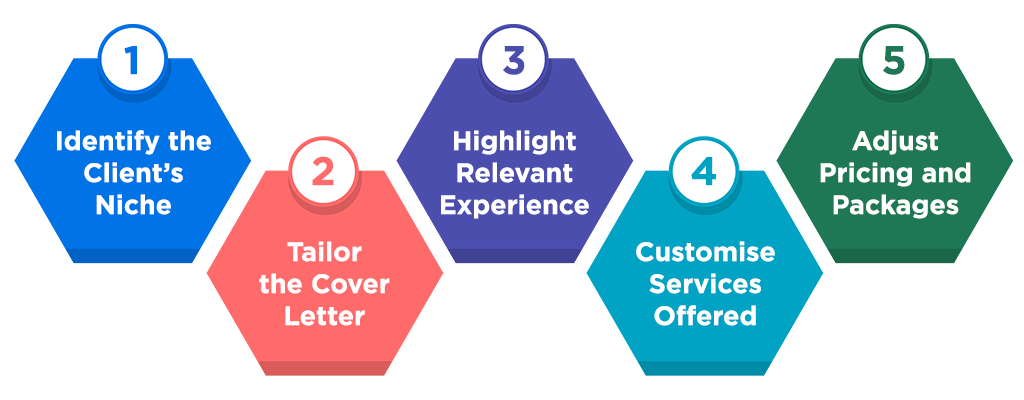
Creating custom proposal templates for accountants is essential in today’s competitive market. Every industry has unique needs, and your proposals must reflect this understanding.
One-size-fits-all approaches rarely win clients. Demonstrating your understanding of the client’s specific situation and objectives by highlighting their industry, size, and specific accounting challenges shows that you’ve done your homework and are proposing tailored solutions.
This guide shows you how to customize proposals for clients across different accounting verticals.
Related post – How Customised Accounting Proposals can Improve Client Acquisition?
Why Industry-Specific Proposals Matter in the UK
Generic proposals fail because they don’t address specific client pain points. Each business type faces different challenges and regulatory requirements.
Construction companies need job costing expertise. E-commerce businesses require inventory management skills. Real estate firms demand property accounting knowledge.
Industry-specific proposals accounting demonstrates your expertise. They show potential clients you understand their world and can solve their problems.
Understanding Different Accounting Niches in the UK
E-commerce Businesses
E-commerce companies face unique accounting challenges. They deal with online payment processors, international sales, and complex inventory tracking.
Key areas to address in accounting proposal e-commerce clients include VAT compliance across multiple jurisdictions. They also need help with inventory valuation and cost of goods sold calculations.
Digital payment processing creates reconciliation challenges. Your proposal should highlight experience with platforms like Shopify, Amazon, and PayPal.
Construction and Trades
Construction businesses operate differently from other industries. They use job costing, deal with retention payments, and face cash flow challenges.
A bookkeeping proposal template for tradies must address these specific needs. Job costing helps track profitability per project, whilst retention accounting ensures accurate cash flow reporting.
Construction accounting is a specialized form of accounting that helps contractors track, manage and report their financial data more accurately than standard accounting.
Real Estate
Real estate businesses have complex property accounting needs. They manage rental income, property depreciation, and capital improvements tracking.
A proposal template for real estate accountants should cover property management accounting. This includes tenant deposit handling, maintenance expense categorisation, and 1031 exchange compliance.
Real estate investment trusts require additional expertise in tax reporting and investor communications.
Related post – How to write a high performing accounting services proposal
Core Components of Custom Proposal Templates for UK Accountants
Executive Summary Section
Start with a compelling executive summary tailored to their industry. Address specific pain points and demonstrate industry knowledge immediately.
For e-commerce clients, mention inventory challenges and sales tax complexity. For construction clients, highlight cash flow management and job profitability tracking.
Keep this section concise but impactful. Use industry-specific language that resonates with your target audience.
| Industry | Core Services | Specialized Needs |
|---|---|---|
| E-commerce | Monthly bookkeeping, Tax prep | Sales tax filing, Inventory management |
| Construction | Job costing, Cash flow | Retention tracking, Progress billing |
| Real Estate | Property accounting, Rental income | Depreciation schedules, CAM reconciliations |
| Manufacturing | Cost accounting, Inventory | Work-in-progress tracking, Standard costing |
| Professional Services | Time tracking, Project accounting | Client billing, Revenue recognition |
Pricing by Industry Considerations in the UK
Different industries require varying levels of complexity in their accounting. This affects your pricing structure and service delivery model.
E-commerce businesses often need monthly services due to high transaction volumes. Construction companies might prefer project-based pricing aligned with job schedules.
Real estate clients typically need quarterly services unless they’re active property managers. Consider seasonal fluctuations in their business cycles when structuring payments.
Engagement Letter Customization
Your engagement letters must reflect industry-specific risks and requirements. Each sector has different compliance obligations and professional standards.
Construction clients need clear terms about job costing accuracy and progress billing procedures. E-commerce clients require specific language about sales tax responsibilities and data security.
Include industry-specific disclaimers and limitation of liability clauses. This protects both parties and demonstrates professional expertise.
Related post – Features to Look for in Accounting Proposal Software
Customisation Strategies for Each Niche
E-commerce Customisation Tips
Focus on their multi-channel sales complexity. Highlight experience with their specific platforms and payment processors.
Address inventory challenges prominently. Many e-commerce businesses struggle with accurate stock valuations and cost tracking.
Mention international sales tax compliance if relevant. Cross-border e-commerce creates additional complexity that requires specialist knowledge.
Construction Industry Adaptations
Emphasise job costing capabilities from the start. Construction profitability depends on accurate project cost tracking.
Address cash flow management prominently. Construction businesses face unique cash flow challenges due to retention payments and progress billing.
Highlight experience with construction-specific software. Integration with project management tools shows you understand their workflow.
Real Estate Sector Modifications
Lead with property management experience. Real estate clients need accountants who understand rental property complexities.
Address depreciation expertise early. Property depreciation rules are complex and mistakes can be costly.
Mention 1031 exchange experience if applicable. Many real estate investors need this specialized knowledge.
Client-Specific Proposal Examples
Small E-commerce Business Example
Challenge: Online retailer struggling with inventory tracking and multi-state sales tax compliance.
Solution: Monthly bookkeeping with inventory reconciliation and automated sales tax filing.
Outcome Focus: Accurate inventory valuations and streamlined tax compliance process.
Mid-Size Construction Company Example
Challenge: General contractor needs better job profitability tracking and cash flow management.
Solution: Integrated job costing system with monthly financial reporting and cash flow forecasting.
Outcome Focus: Improved project profitability and predictable cash flow management.
Real Estate Investment Firm Example
Challenge: Property investment company requires comprehensive rental income tracking and tax optimization.
Solution: Property-level accounting with depreciation tracking and quarterly investor reporting.
Outcome Focus: Maximized tax benefits and transparent investor communications.
Related post – How To Write A Bookkeeping Proposal That Wins Clients
Scoping by Niche Requirements
Determining Service Scope
Each industry requires different service levels and frequencies. E-commerce businesses often need monthly services due to high transaction volumes.
Construction companies might require weekly job cost updates during active projects. Real estate firms typically need quarterly services unless actively managing properties.
Consider seasonal variations in each industry. Retail businesses peak during holidays, whilst construction slows in winter months.
Resource Allocation Planning
Different niches require varying skill sets and time commitments. E-commerce clients need technology-savvy team members familiar with integration tools.
Construction accounting requires understanding of job costing principles and industry-specific software. Real estate work demands knowledge of property accounting standards and tax regulations.
Plan your team assignments based on industry expertise. This ensures quality service delivery and client satisfaction.
Proposal Sections by Business Type
Standard vs. Specialized Sections
All proposals need basic sections like scope, pricing, and terms. However, specialized sections vary by industry and client needs.
E-commerce proposals should include sections on inventory management, sales tax compliance, and payment processor reconciliation procedures.
Construction proposals need job costing methodology, progress billing procedures, and cash flow management sections.
Industry-Specific Add-ons
Consider additional proposal sections that demonstrate deep industry knowledge. These might include compliance checklists, industry benchmarking, or specialized software recommendations.
For e-commerce clients, include sections on inventory optimization and sales tax automation. Construction clients benefit from project profitability analysis sections.
Real estate proposals should include property performance reporting and tax planning sections.
Technology Integration Considerations
Industry-Specific Software
Each niche uses different software platforms that require integration with accounting systems. E-commerce clients use Shopify, WooCommerce, or Amazon seller tools.
Construction companies rely on project management software like Procore, Buildertrend, or CoConstruct. Real estate firms use property management platforms like AppFolio or Buildium.
Highlight your experience with their existing technology stack. Propose integration solutions that streamline their workflow and improve accuracy.
Automation Opportunities
Different industries benefit from various automation opportunities. E-commerce businesses can automate sales tax calculations and inventory updates.
Construction companies benefit from automated job cost allocation and progress billing generation. Real estate firms can automate rent collection tracking and expense categorization.
Include automation proposals that save time and reduce manual errors. This adds value and justifies higher fees.
Measuring Success Across Niches
Key Performance Indicators
Success metrics vary by industry. E-commerce clients care about inventory turnover, gross margins, and sales tax accuracy.
Construction companies focus on job profitability, cash flow predictability, and project completion rates. Real estate firms measure property performance, occupancy rates, and return on investment.
Define industry-relevant KPIs in your proposals. This shows you understand what matters to their business success.
Reporting Requirements
Each industry has different reporting needs and frequencies. E-commerce businesses need frequent inventory reports and sales analysis.
Construction companies require regular job cost reports and cash flow projections. Real estate clients need property performance reports and investor communications.
Tailor your reporting proposals to match their decision-making cycles and information needs.
Related post – From Draft to Deal: The Proposal Process for accountants
Common Mistakes to Avoid
Generic Language Usage
Avoid using the same language across all proposals. Each industry has specific terminology that demonstrates your expertise.
Don’t use construction terms in e-commerce proposals or real estate language for manufacturing clients. This immediately signals a generic approach.
Research industry-specific terminology and use it naturally throughout your proposals. This shows genuine understanding of their business.
Overlooking Compliance Requirements
Each industry has unique compliance obligations that affect accounting requirements. E-commerce businesses face sales tax nexus rules and international trade regulations.
Construction companies must comply with prevailing wage laws and bond requirements. Real estate firms deal with fair housing regulations and property tax assessments.
Address relevant compliance requirements in your proposals. This demonstrates professional competence and reduces client concerns.
Inadequate Risk Assessment
Different industries carry varying levels of risk that affect your service delivery and pricing. High-risk industries require more detailed procedures and higher insurance coverage.
Construction and real estate typically carry higher liability risks than professional services. E-commerce businesses face technology and data security risks.
Address industry-specific risks in your proposals and pricing structure. This protects your firm whilst demonstrating professional awareness.

Implementation Timeline and Process
Phase 1: Research and Planning (Week 1-2)
Research your target industry thoroughly. Understand their business cycles, common challenges, and regulatory requirements.
Study industry publications and trade associations. Attend industry events or webinars to deepen your knowledge.
Create templates for each target niche based on your research findings.
Phase 2: Template Development (Week 3-4)
Develop industry-specific proposal templates using your research. Include relevant case studies and client-specific proposal examples.
Create supporting documents like engagement letters and service agreements tailored to each niche.
Test your templates with existing clients or industry contacts for feedback.
Phase 3: Implementation and Refinement (Week 5-8)
Begin using your customized templates for new prospects. Track response rates and client feedback carefully.
Refine templates based on real-world results and client interactions. Update language and sections that don’t resonate well.
Build a library of successful proposals for each niche to reference for future opportunities.
Related post – How to format an engagement letter
Frequently Asked Questions
Conclusion
Creating custom proposal templates for accountants in the UK requires industry research, specialised knowledge, and tailored communication strategies. Success comes from understanding each sector’s unique challenges — from VAT and Making Tax Digital (MTD) obligations to CIS requirements in construction or property tax rules for real estate — and positioning your services accordingly.
Remember that customising proposals for UK clients means more than changing a few words. It requires a fundamental understanding of their business model, compliance responsibilities with HMRC and Companies House, and the specific success metrics that matter in their industry.
By investing time in developing UK industry expertise and creating truly tailored templates, you will significantly improve your proposal win rates and client satisfaction levels while demonstrating authority in the UK accounting landscape.
Stop Sending Generic Proposals
Win more clients with industry-specific, branded proposals — complete with engagement letters and eSignature.
Try the Proposal ToolParul is a content specialist with expertise in accounting and bookkeeping. Her writing covers a wide range of accounting topics such as payroll, financial reporting and more. Her content is well-researched and she has a strong understanding of accounting terms and industry-specific terminologies. As a subject matter expert, she simplifies complex concepts into clear, practical insights, helping businesses with accurate tips and solutions to make informed decisions.

